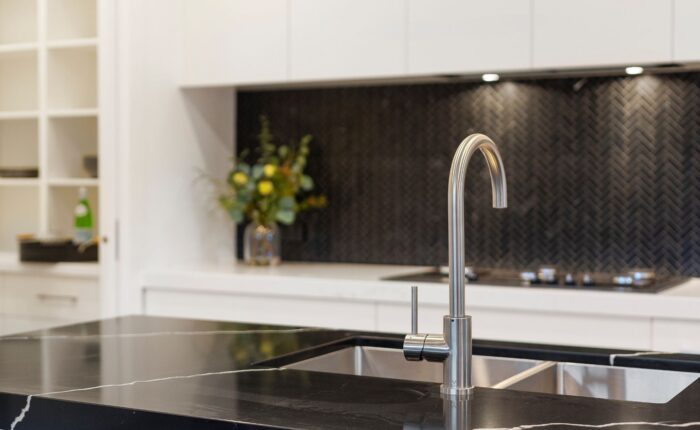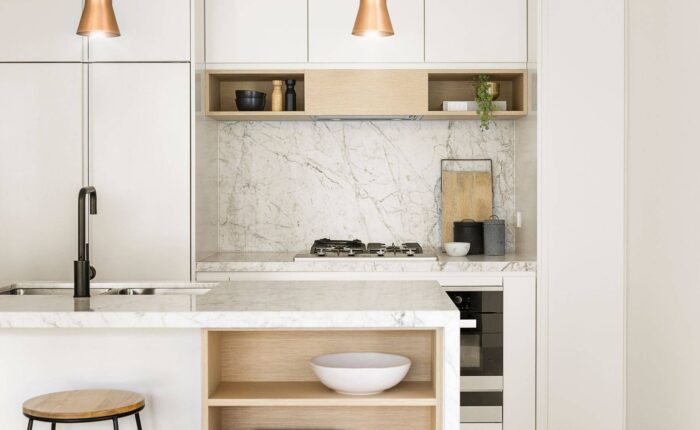In a game marble vs. quartz worktops, we are your worktop specialist in Buckinghamshire that will give you all the right answers. As one of the leading worktop specialists in Buckinghamshire, all the way from Amersham and Chesham, across Beaconsfield and Gerrards Cross, all the way to High Wycombe, we often get asked which worktops are the best – marble vs. quartz worktops.
Given that our selection of natural and manufactured stones is vast, answering the question of marble vs. quartz worktops isn’t always an easy task. The truth of the matter is, the perfect worktop for you is the one you pick based on your needs and overall style.
Of course, given that that’s not particularly helpful to those who are a bit lost or overwhelmed with the selection in front of them, let’s see what the two out of three top contenders have to offer, shall we?
Today, we’re discussing the difference between artificial and natural stone. In other words, we’re watching the battle between quartz vs. marble worktops!
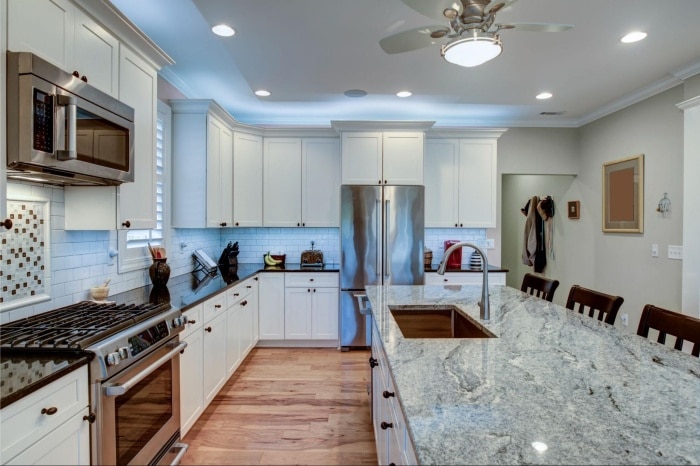
Marble Kitchen Worktops — the Epitome of Elegance
It’s a well-known fact that marble, quartz, and granite worktops are the top three choices when it comes to kitchen remodelling. They are more elegant and durable than solid wood worktops and more scratch and heat resistant than laminate worktops.
Not to mention, they are exquisite in their beauty. Both natural stones, like marble, and manufactured worktops like quartz have natural colors and patterns that complement practically any style. So in a game marble vs. quartz worktops, they both win in this category.
Marble is a natural stone that has been the epitome of elegance for centuries. It used to be a luxury, but it also had many uses, which is why we see it in prominent, important buildings. That’s also why it was so eminently used in art. It was a staple piece of ancient architecture due to its durability and appearance, and it maintains its appeal today.
This metamorphic rock is not indigenous to one continent and can be found worldwide. However, it’s still not that common, which makes it a luxury item. Not that long ago, having marble countertops was a sign of opulence and extravagance.
Today, marble is much more present in everyday homes. But that still doesn’t make it ordinary. This dazzling natural stone that comes in many colours and patterns (from crisp and elegant white marble to bold, playful pink one) will turn any kitchen into a work of art.
But that’s not the only benefit of marble.
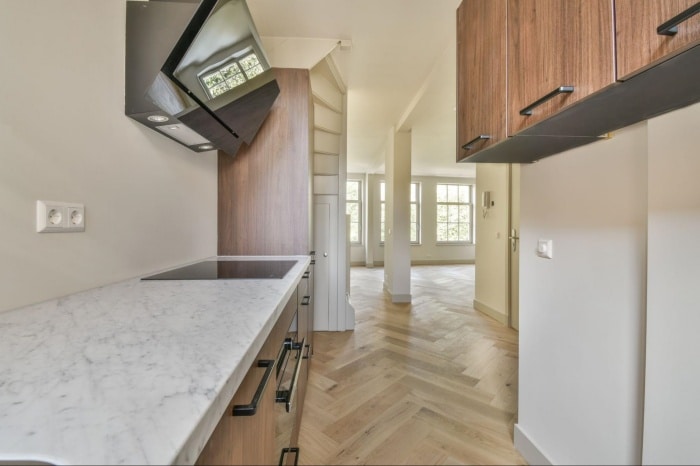
The Pros of Marble Worktops
Marble worktops are:
- elegant
- natural
- traditional
- great when it comes to resale value
Although smoky quartz and other quartz crystals that shimmer throughout quartz worktops have their charm, marble simply screams “luxury.” One of the huge benefits is that it’s a natural stone.
Marble worktops are made from natural marble that comes in raw slabs that are then sliced, blasted, and buffed. After that, the marble is polished to achieve that signature glossy look you see all over our (and other) showroom.
So, marble is a premium material. It’s also traditionally elegant and unique. As mentioned, marble is a natural stone, and, as we know, nature rarely repeats itself.
That means that each slab of marble is unique. If you opt for marble worktops, you’ll have an exclusive work of art in your home that’s like no other.
The Cons of Marble Worktops
Of course, no material is without flaws. Marble worktops also:
- darken with age
- prone to water stains and etching
- porous and not as durable as quartz
- quite visible seams
- require frequent resealing
Overall, as a natural stone, marble has quite a few flaws that come with the territory. As mentioned, it comes in slabs that are somewhat difficult to cut. That means that installing marble worktops isn’t without challenges. It also, unfortunately, means that seams between the pieces of marble will be visible. So, that’s something to consider when you’re choosing marble vs. quartz worktops.
The marble slab is as big as it is, which means that creating bespoke marble worktops is a bit like creating a puzzle. Now, a professional worktop specialist will ensure that the seams are as inconspicuous as possible. But they’ll still be there.
Aside from that, marble also darkens with age (especially light marble) and is more prone to damages (by various chemicals, water, and heat). All of this makes it less than ideal for outdoor use (just in case you were thinking about remodeling your outdoor kitchen with it). Now, you have a clearer picture of worktops and differences when choosing marble vs. quartz worktops. But, before you make a rash decision, let’s see what makes quartz worktops so unique.
Quartz Countertops — Harmony of Durability and Style
Quartz is an engineered stone made from crushed scraps of different natural stones (among which are marble, granite, and quartzite or silicon dioxide. These scraps are mixed with resin and pigments in order to reach the desired consistency, hardness, color, and pattern.
Quartz can be molded into slabs which makes cutting it to measure much more manageable than is the case with marble.
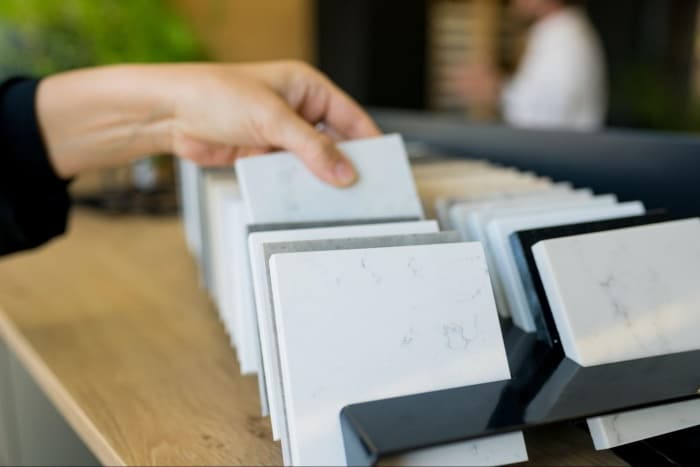
The Pros of Quartz Worktops
The benefits of quartz worktops:
- Easy to install
- Consistent when it comes to pattern, colour, and shine
- Sealing is optional
- Seams are invisible
- Heat and scratch-resistant
Quartz, or rock crystal, is a natural stone. However, when we talk about quartz worktops, we are actually talking about a manufactured material. This material is artificially made, which means it can look practically any way you want it to. That means there’s a more extensive selection of colours and patterns than is the case with marble worktops.
However, the most significant benefit of quartz is that it’s non-porous and extremely durable. Quartz scores an impressive seven on the Mohs hardness scale, while both marble and granite score 5 or 6. In this category, we can see who wins in a game marble vs. quartz worktops.
Being so durable also means that quartz is heat and stain-resistant. Not much can penetrate the upper layers of quartz. What’s more, the durability of the stone also means that scratches aren’t that likely to happen. In turn, that means you don’t have to worry about whether your quartz worktops are filled with bacteria and potentially dangerous.
All of this also means that quartz is super easy to maintain. You don’t have to regularly reseal it, and you only really need to clean it with some mild products and a damp cloth.
The Cons of Quartz Worktops
Not even man can create perfection, which is why quartz worktops have some downfalls:
- doesn’t behave well in direct sunlight
- the durability o the stone also means it’s heavier, which might make installation difficult
- not as coveted as marble
Quartz doesn’t have that many cons. It’s more environmentally friendly than any other natural rock. However, that doesn’t mean it doesn’t have any flaws.
One of quartz’s most significant advantages is one of its biggest flaws. There are quite a few varieties of quartz available on the market. They differ when it comes to colors, patterns, shine, and overall appearance. However, they do have one thing in common — size.
The material is heavy and bulky, which means that it’s more difficult to install. That also means it’s more expensive to install. So, although quartz is more affordable than marble, that’s only true to some extent.
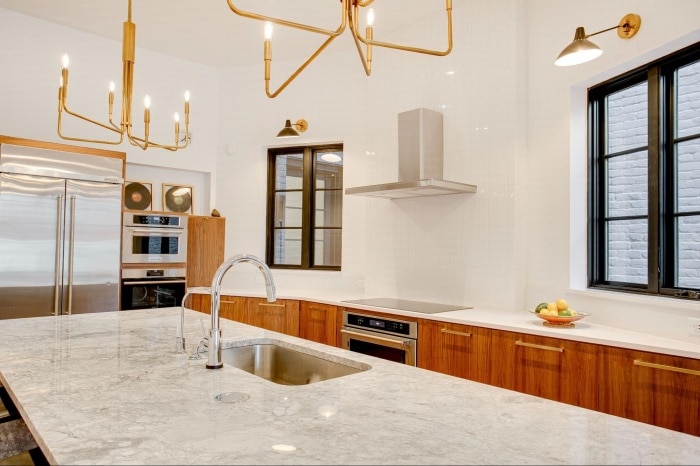
Marble vs. Quartz Worktops – Main Differences
Overall, in a game marble vs. quartz worktops, they are as different as they are similar. The main differences between the two worktop materials (which will potentially help you make a decision between them) are:
- The origin — marble is a completely natural stone while quartz is engineered. So, if you’re looking for something organic, marble might be the best choice for you.
- Consistency — as organic and natural as it is, marble can’t offer consistency. If you have a big kitchen and would like a consistent pattern throughout the entire room, then you might want to opt for quartz.
- Installation — of course, you won’t be installing your worktops on your own. However, installation is still something you need to consider. Marble is easier to install simply because it’s lighter than quartz. It is, however, a more difficult material to work with when it comes to precise measuring and hiding seams.
- Heat resistance — heat resistance is of the utmost importance in the kitchen. If you cook a lot and have a habit of leaving hot pits and pans all over your counters, then marble might not be the best choice for you.
- Durability — there’s no material that’s as or more durable than quartz. It’s made with durability in mind and will withstand practically anything. However, that doesn’t make it indestructible, so keep that in mind.
- Maintenance and repairs — quartz is easier to maintain and repair (if need be). Marble requires regular, frequent resealing, while you don’t even have to seal quartz worktops in the first place.
BucksMarble — The Best Worktop Supplier in the County
Are you looking to remodel your kitchen? Then look no further than BucksMarble. As leading worktop specialists in the area that have decades of experience in the business, we’ll be more than happy to help you make a choice – marble vs. quartz worktops.
Our vast selection of colours and patterns in both categories may seem overwhelming at first. However, together with our design team, we’ll help you make the best choice for your kitchen! So call us today at 01494793515 or send us an email at info@bucksmarble.com and book your consultation!


